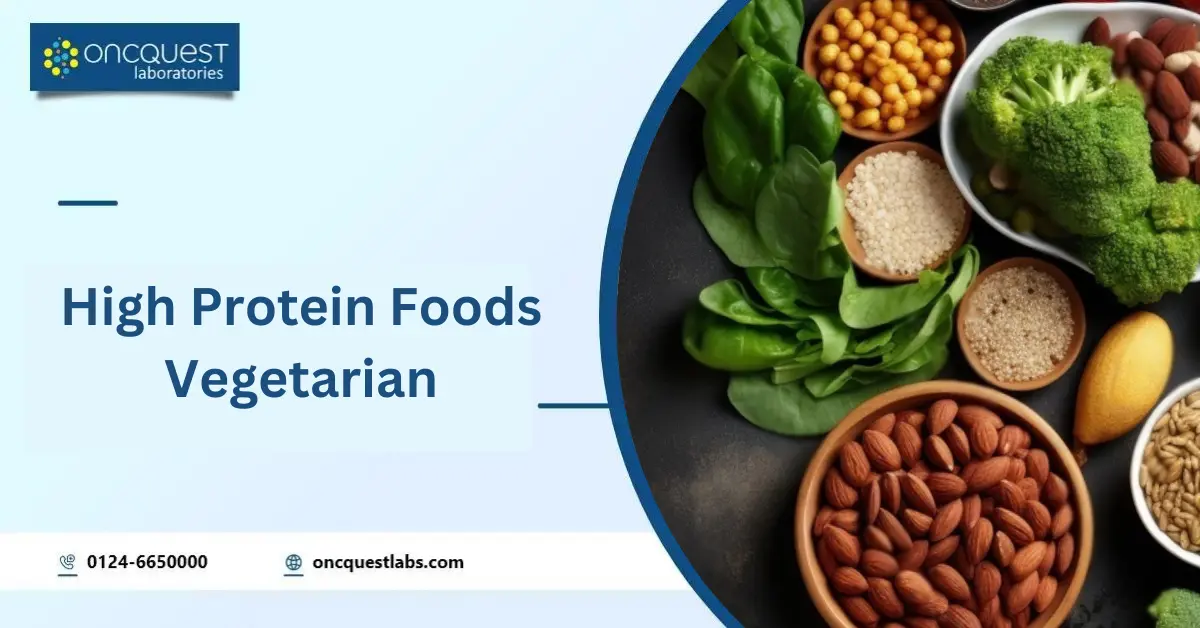Proteins play a crucial role in our daily nutrition, supporting the growth and health of muscles, cells, and vital tissues.
In India, a significant number of individuals opt for vegetarian diets. While these diets are generally nutritious, they may sometimes lack specific nutrients like vitamin B12 and proteins. It’s common in clinical settings to encounter vegetarians with low vitamin B12 levels. However, research indicates that vegetarians have a reduced risk of developing heart disease and its complications.
Here, we’ll explore a concise list of protein-rich foods suitable for vegetarians.
Contents
The Need For Protein
Proteins are like building blocks made of tiny parts called amino acids. These amino acids are super important for helping our cells grow and develop, which is something that happens all throughout our lives. Proteins are not just important for our organs like the heart and lungs but also for things we can see like our skin and hair. If we don’t eat enough protein, our muscles can become weak and we might lose muscle mass, which can make us feel weaker overall. When people are getting better from being sick, eating a lot of protein can actually help them recover faster.
For example, if you weigh between 45 to 50 kilograms and are not very active, you need about 64 to 70 grams of protein every day. But if you’re really active, like a sports player or someone who does weight training, you might need more, like 77 to 85 grams.
It’s important to remember that everyone’s protein needs can be different based on things like age, if they’re a boy or a girl, how much they move around, and if they’re having a baby or breastfeeding. In vegetarian diets, there are plenty of foods that have a lot of protein, such as beans, lentils, tofu, nuts, seeds, and dairy products like yogurt and cheese.
High Protein Rich Food For Vegetarians
1. Lentils
Lentils are small, nutrient-dense legumes available in various colors such as green, brown, red, and black. They are an excellent source of plant-based protein, providing about 18 grams per cooked cup. Rich in dietary fiber, lentils aid in digestion and help maintain stable blood sugar levels. They are also packed with essential nutrients like iron, folate, and magnesium, and are low in fat. Versatile and affordable, lentils can be used in soups, stews, salads, and a variety of other dishes, making them a staple in vegetarian diets.
2. Chickpeas
Chickpeas, also known as garbanzo beans, are a highly nutritious legume rich in protein and fiber, making them an excellent choice for vegetarians. A cup of cooked chickpeas provides about 15 grams of protein and 12 grams of fiber. They are also packed with essential nutrients like iron, folate, phosphorus, and manganese. Versatile in culinary uses, chickpeas can be added to salads, blended into hummus, or roasted for a crunchy snack. Their low glycemic index helps in managing blood sugar levels effectively.
3. Quinoa
Quinoa is a highly nutritious grain, often considered a superfood. It is a complete protein, containing all nine essential amino acids, making it an excellent protein source for vegetarians. A cooked cup provides about 8 grams of protein, along with dietary fiber, iron, magnesium, and manganese. Quinoa is gluten-free, easy to digest, and versatile in cooking. It can be used in salads, soups, or as a substitute for rice or pasta, offering a healthy, nutrient-dense option for a balanced diet.
4. Tofu
Tofu, made from soybeans, is a versatile and protein-rich food, providing about 10 grams of protein per 1/2 cup serving. It is a staple in many vegetarian and vegan diets due to its ability to absorb flavors and its various textures, from soft to firm. Tofu is also low in calories and contains essential nutrients such as calcium, iron, and magnesium. It can be grilled, stir-fried, blended into smoothies, or added to soups and salads, making it a valuable addition to a balanced diet.
5. Tempeh
Tempeh is a soy-based food made from fermented soybeans, offering a substantial protein punch, with about 21 grams per 1/2 cup. Its firm texture and nutty flavor make it a versatile ingredient in vegetarian cooking. Beyond its protein content, tempeh is also rich in fiber, vitamins, and minerals. Due to its fermentation process, it contains probiotics, beneficial for gut health. Commonly used in stir-fries, sandwiches, or grilled dishes, tempeh is a nutritious and flavorful addition to any plant-based diet.
6. Greek Yogurt
Greek yogurt is a thick, creamy yogurt known for its rich texture and tangy flavor. It is made by straining regular yogurt to remove the whey, resulting in a higher concentration of protein and a thicker consistency. With approximately 10 grams of protein per 6-ounce serving, Greek yogurt is a popular choice for those looking to boost their protein intake. It can be enjoyed on its own, mixed with fruit or honey, or used as a creamy addition to smoothies and sauces.
7. Chia Seeds
Chia seeds are tiny black seeds derived from the Salvia hispanica plant, native to Mexico. Despite their small size, they pack a nutritional punch. Rich in omega-3 fatty acids, fiber, protein, and various vitamins and minerals, including calcium and magnesium, chia seeds offer numerous health benefits. They are renowned for their ability to support heart health, aid in digestion, and promote satiety. Chia seeds can be easily incorporated into smoothies, yogurt, oatmeal, or used as an egg substitute in vegan baking recipes.
These foods can help vegetarians meet their protein needs while enjoying a varied and nutritious diet.
Frequently asked questions
Q1: Which veg has the highest protein?
A1: Among vegetarian options, soybeans (including products like tofu and tempeh) typically have the highest protein content, with approximately 36 grams of protein per 100 grams.
Q2: How to eat 100g protein a day vegetarian?
A2: To consume 100g of protein daily on a vegetarian diet, include protein-rich foods like lentils, legumes, tofu, tempeh, nuts, seeds, and dairy products in your meals. Aim for a balanced intake throughout the day, incorporating protein sources into each meal and snack.
Q3: How to get 40 grams of protein a day vegetarian?
A3: To get 40 grams of protein daily on a vegetarian diet, include protein-rich foods such as lentils, chickpeas, beans, tofu, tempeh, nuts, seeds, and dairy products in your meals. Focus on consuming a variety of these foods throughout the day to meet your protein target.





